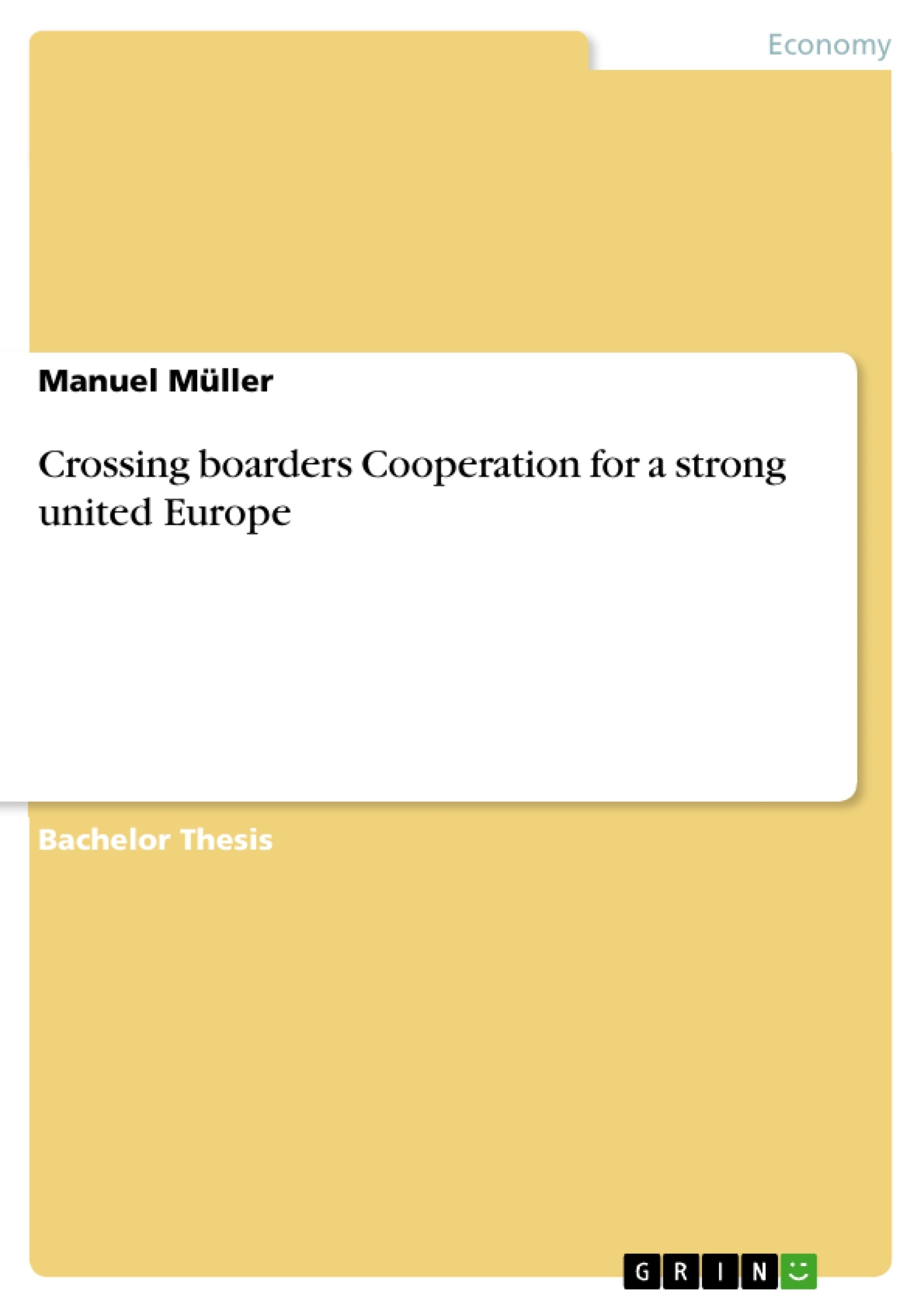In der Arbeit geht es um die Grenzen übergreifende Zusammenarbeit zwischen Nationen, Ländern, Kommunen und Regierungsbezirken um ein einheitliches und starkes Europa zu erreichen. Das Ziel ist es weiterhin erfolgreich im Wettbewerb mit den USA, China etc. zu sein und das Denken der Bevölkerung zu stärken Europäer zu sein, nicht nur Nationalstolz zu besitzen.
Die Realisation eines gestärkten Europas wird über finanzierte und subventionierte Projekte der Europäischen Union vorangetrieben. Hierbei werden Infrastrukturen gerade in Entwicklungsländern verbessert aber auch die Mobilität und Arbeitsmöglichkeiten im europäischen Raum verbessert.
Die Arbeit zeigt auf, wie Projekte umgesetzt werden, welche Organe dabei betroffen sind und wie gravierend die Defizite und Auswirkungen mancher Regionen sind.
Inhaltsverzeichnis (Table of Contents)
:- 1 INTRODUCTION
- 2 EDUCATION & TRAINING
- 2.1 Introduction and General Information
- The Lisbon Strategy
- The Bologna Process
- The Key competences
- 2.2 Life-long learning Program 2007-2013
- 3 CENTRAL EUROPE – COOPERATION FOR SUCCESS
- 3.1 Introduction
- How does the Program work?
- Central Europe at a Glance
- Population and Demography
- Economic Development and Labour Market
- Accessibility
- 3.2 Goals and Direction
- CENTRAL EUROPE Precedence´s
- 3.3 SoNorA – South North Axis
- Results and Perspective
- 4 CONCLUSION AND OUTLOOK
Zielsetzung und Themenschwerpunkte (Objectives and Key Themes)
: This thesis explores the impact of European Union programs and projects on the development of new member states in Central Europe, specifically examining whether these countries are successfully catching up to the economic and social standards of their western counterparts. The main focus of the thesis is on two key program areas: "Education and Training" and the "Central Europe Program."- The role of education and training in fostering a knowledge-based economy and reducing disparities between member states.
- The effectiveness of the Life-long Learning Programme (LLP) in promoting transnational learning mobility and modernizing education systems.
- The objectives and strategies of the Central Europe Programme in enhancing territorial cohesion, internal integration, and competitiveness in Central Europe.
- The significance of accessibility, including transport and information and communication technology (ICT), in connecting rural and peripheral areas and promoting regional development.
- The importance of sustainability in achieving long-term growth and avoiding environmental damage.
Zusammenfassung der Kapitel (Chapter Summaries)
:Chapter 1: Introduction
This chapter introduces the overarching goal of the thesis: to assess the impact of EU programs on the development of Central European countries and determine if they are closing the gap with Western EU members. It emphasizes the importance of transnational cooperation, highlighting the role of projects like the Life-long Learning Programme in bridging gaps in education, infrastructure, and economic development.Chapter 2: Education & Training
This chapter delves into the European Union's approach to education and training, focusing on the Lisbon Strategy and the Bologna Process, both of which aim to create a more competitive and integrated European education system. It explores the concept of key competences and the role of programs like the Life-long Learning Programme (LLP) in promoting transnational mobility, skills development, and the transition to a knowledge-driven society.Chapter 3: Central Europe – Cooperation for Success
This chapter examines the Central Europe Programme, a component of the European Territorial Cooperation 2007-2013 policy framework. It outlines the program's objectives, including enhancing territorial cohesion, internal integration, and competitiveness within the Central European region. It also discusses the program's four key priorities: innovation, accessibility, environmental responsibility, and enhancing the attractiveness of cities and regions. The chapter includes an in-depth analysis of the SoNorA project, which aims to improve accessibility and interconnectivity along the South-North axis of Central Europe.Schlüsselwörter (Keywords)
: This thesis focuses on key concepts such as inclusive and exclusive education, empirical research findings, and the significance of European Union programs and projects in promoting economic and social development. It explores the impact of initiatives such as the Life-long Learning Programme (LLP), the Central Europe Programme, and the SoNorA project, analyzing their contributions to territorial cohesion, internal integration, competitiveness, and sustainability in Central Europe. Key terms include: education and training, transnational cooperation, knowledge-based economy, accessibility, infrastructure, innovation, environmental responsibility, and sustainable development.Frequently Asked Questions
What is the main goal of European cross-border cooperation?
The goal is to achieve a united and strong Europe that can successfully compete with global powers like the USA and China, while strengthening a common European identity among citizens.
What is the "Life-long Learning Program 2007-2013"?
It is an EU initiative designed to promote transnational learning mobility, modernize education systems, and foster a knowledge-based economy across member states.
How does the Central Europe Programme support regional development?
The program focuses on enhancing territorial cohesion, innovation, and accessibility, helping newer member states catch up to Western economic and social standards.
What is the significance of the SoNorA project?
SoNorA (South North Axis) aims to improve transport infrastructure and interconnectivity across Central Europe to boost economic development and accessibility.
Why are the Lisbon Strategy and Bologna Process important?
These frameworks aim to create a more competitive European education system and ensure that key competences are standardized and recognized across the EU.
- Quote paper
- Manuel Müller (Author), 2011, Crossing boarders Cooperation for a strong united Europe, Munich, GRIN Verlag, https://www.grin.com/document/193530



